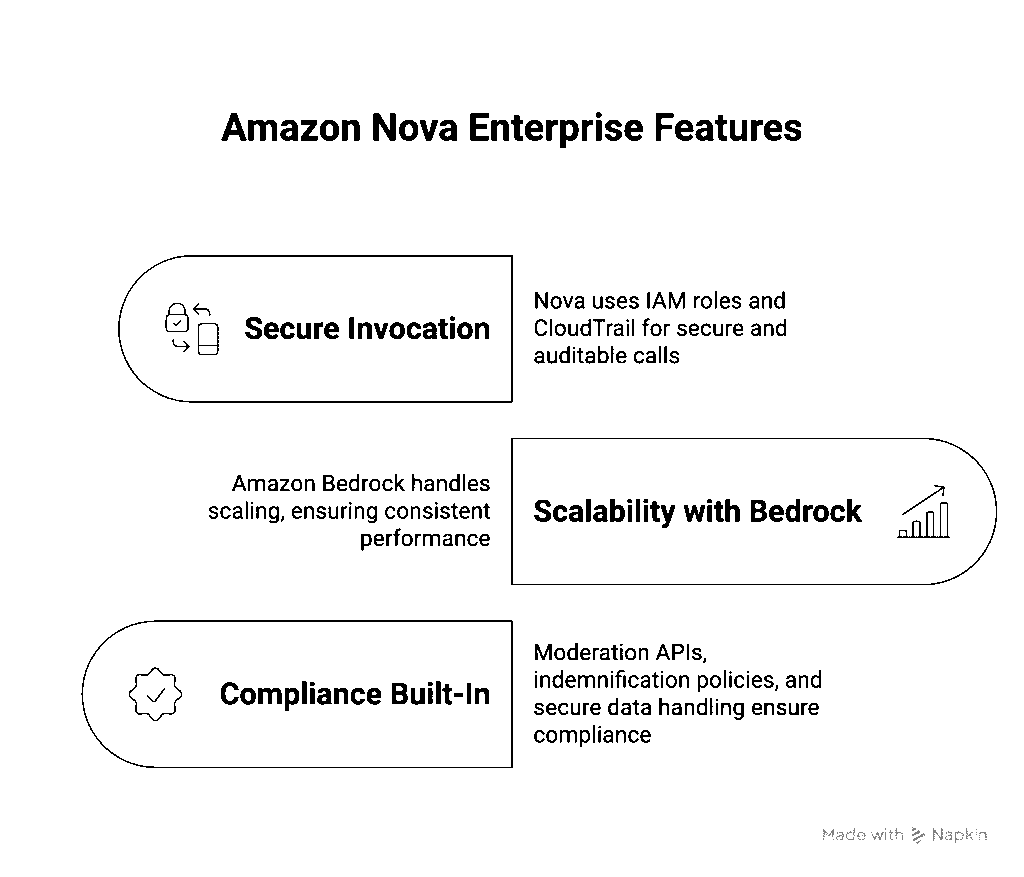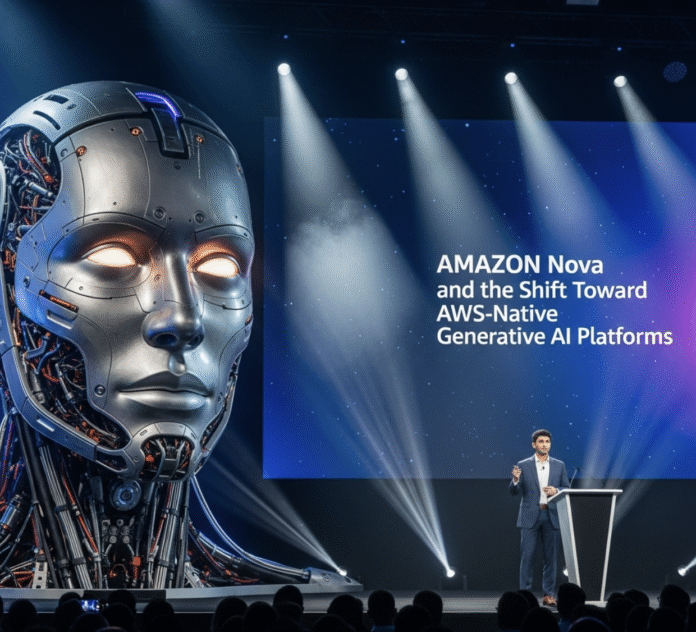Contributed post: Thank you to the team at Halo Radius for sharing their insights with the TechForward community!
Developers don’t have time for models that only shine in demos. They want tools that can produce accurate results, handle fluctuating production traffic, integrate securely with existing systems, and pass enterprise compliance requirements. That’s the gap Amazon Nova aims to fill for existing and potential AWS AI-focused customers.
Unlike external APIs that bolt AI onto your stack, Amazon Nova is AWS-native from the ground up. It inherits IAM, CloudTrail, and Bedrock scaling, making it feel like every other AWS service you already trust. No separate auth flows. No risky data egress. Just secure, scalable, enterprise-ready AI.
This isn’t just about convenience; it’s about acceleration. By running inside AWS infrastructure, Amazon Nova reduces a lot of friction. This covers the entire lifecycle, from setting up initial tools to ensuring compliance with security requirements. The outcome is a faster time-to-production and reduced risk when integrating generative AI into enterprise workflows.
Why does the recent innovation within Amazon Nova represent such a significant milestone in the adoption of generative AI? Let’s dive in.
Why AWS-Native Generative AI Matters
When you hear “native” in AWS terms, it means more than running on the cloud. AWS-native models have deep integration with AWS security, monitoring, and billing primitives you already trust for Amazon EC2 or Amazon S3.
Amazon Nova integrates with IAM roles for fine-grained access control and logs all usage in AWS CloudTrail. That helps because compliance teams can trace who accessed what, when, and under which policies. Compare that with external APIs, where audit trails and access management often stop at API keys.
AWS-native also eliminates a lot of infrastructure overhead. Developers don’t have to provision GPUs or manage scaling clusters. Amazon Bedrock abstracts that away, so you focus on the workflow, not capacity planning.
API-first providers can work for prototypes, but in production, security reviews and governance slow down adoption.
What Is Amazon Nova?
Amazon Nova isn’t just a single model. It’s a lineup of highly-tuned foundation models designed for diverse requirements. Each model offers a different balance of cost, latency, and capability.
Nova Micro
Optimized for speed and cost. Ideal for short prompts, log summarization, or real-time chatbots where response time is critical.
Nova Lite
A middle ground between speed and intelligence. Works well for search, classification, and lightweight assistants at enterprise scale.
Nova Pro
The multimodal powerhouse. Handles text, images, and video in the same request. With a 300,000-token context window, Pro ingests entire documents, transcripts, or PDFs without chunking.
Nova Premier
This is the most advanced reasoning model in the Amazon Nova family. Used for long-form analysis, multi-step problem solving, and distilling large datasets into actionable insights.
This tiered design means teams don’t choose between “fast” and “intelligent.” They match the right model to the workload.
How Nova Works in Enterprise Workflows
Enterprises adopt tools that play well with their stack. Amazon Nova is designed to provide flexibility for enterprise AI with the security and support that organizations depend on from AWS.
Secure Invocation with IAM and CloudTrail
Every call to Nova happens under IAM roles you define. Permissions map to existing enterprise policies. CloudTrail logs all calls, so every action is auditable.
Scalability with Bedrock
You don’t size or deploy clusters. Amazon Bedrock handles scaling based on demand. Whether you run one request or thousands per second, Nova maintains performance without manual intervention.
Compliance Built-In
Moderation APIs filter out unsafe content, indemnification policies mitigate risk, and secure data handling keeps prompts and outputs within AWS. These safeguards are part of the service, not bolt-ons.

Together, these features make Nova predictable and compliant in enterprise workflows.
Real-World Use Cases for Amazon Nova
Actual outcomes are more significant than abstract benefits. This is how Amazon Nova models power production workloads today.
Nova Micro: Customer Support Bots
A retailer uses Nova Micro to power support chatbots. With low-latency responses under 200ms, customers get real-time help, while the enterprise avoids scaling costs of larger models.
Nova Lite: Enterprise Search and Classification
An internal knowledge assistant built on Nova Lite indexes thousands of technical documents. Employees query in natural language, and the model returns precise results without retraining.
Nova Pro: Multimodal Contract Review
A compliance team ingests hundreds of scanned PDFs into Nova Pro. With multimodal support, the model answers questions about clauses, signatures, and key terms across entire contract sets.
Nova Premier: Long-Form Research and RAG Pipelines
Research groups can rely on Nova Premier for cross-document analysis. They feed into multi-year scientific studies, and the model generates structured summaries with references. Premier’s long context reduces the need for complex retrieval orchestration.
These use cases prove Nova isn’t a demo. It’s already solving production-scale problems.
AWS-Native vs. External Platforms
To see how AWS-native changes the equation, compare Nova with external models like GPT-4 Turbo and Claude.
| Capability | Amazon Nova (AWS-Native) | GPT-4 Turbo (OpenAI) | Claude 2.1 (Anthropic) |
| Deployment | AWS Bedrock, IAM, CloudTrail | External API | External API |
| Context Window | Up to 300K in Pro, up to 1M in Premier | 128K | 200K |
| Modality | Text, Image, Video (Pro) | Text | Text |
| Security Integration | IAM roles, CloudTrail audit | API key only | API key + basic logging |
| Compliance | Built-in moderation, indemnification | External policies | Limited indemnification |
| Best Fit | Production enterprise workloads | Prototyping, chat apps | Long text QA, limited enterprise |
The takeaway: Nova doesn’t just match features—it embeds compliance and governance into the workflow.
Why Amazon Nova Matters for Developers
Developers face a constant trade-off: build fast or build compliant. Amazon Nova reduces that tension in many important ways.
Because it’s AWS-native, Amazon Nova uses the same primitives you already understand. You don’t glue together API calls with custom auth layers or write extra compliance wrappers. You invoke the model like any other AWS service.
That means faster proof-of-concept to production. No waiting on security reviews for third-party APIs. No reinventing audit trails. Just one Bedrock call, governed by IAM, logged by CloudTrail, and billed on your AWS invoice.
For developers, that’s the “why”: less friction, fewer moving parts, and confidence that what works in dev will pass enterprise checks in production.
Conclusion
The shift toward AWS-native generative AI is happening now. Amazon Nova is leading that shift, combining foundation models with IAM, CloudTrail, and Amazon Bedrock scaling to deliver production-ready AI. From chatbots to multimodal analysis, Nova gives enterprises a secure, compliant, and scalable way to bring generative AI into real workloads.
For developers, Nova means faster builds with fewer blockers. For enterprises, it means compliance without compromise.
Ready to see how Amazon Nova can fit into your stack? Halo Radius helps teams deploy Amazon Nova models in production workflows, unlocking secure, enterprise-grade AI at scale.
Halo Radius is a consulting collective led by experienced Silicon Valley CTOs and engineering leaders. They help clients in Technology, Finance, and Logistics solve complex problems and accelerate growth. With expertise in Generative AI, LLMs, Machine Learning, Data Science, and cost-efficient software development, they build world-class SaaS and AI products. Their work combines technical precision with strategic clarity to deliver results that scale.


